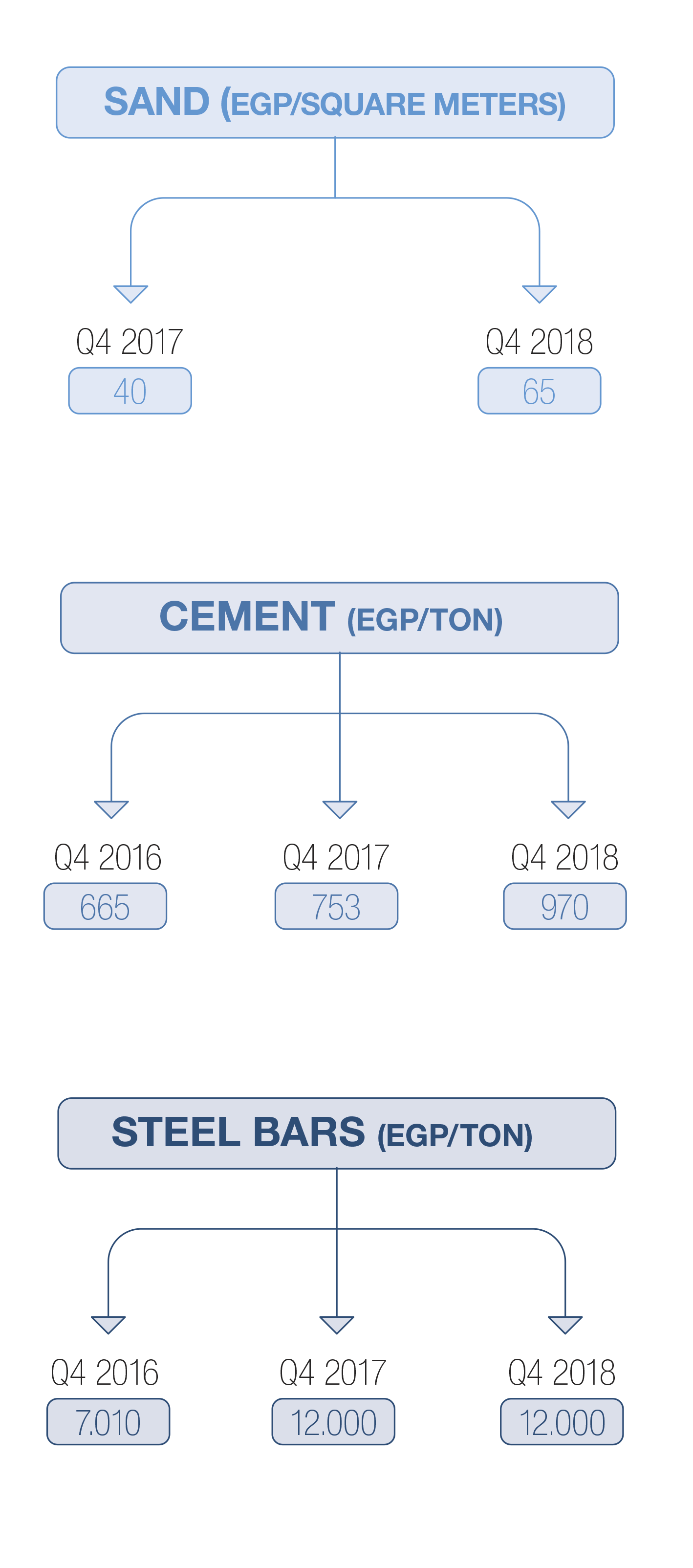Now with Egypt’s urban and real estate development growing significantly and developers adopting several techniques to promote their projects, one may find a developer offering a stand-alone villa in a compound for EGP 20 mn, while another developer sells a similar villa of the same exact surface area for EGP 10 mn. Do you wonder why?
You will probably find the first located in an A+ compound, while the other is in a lower-quality compound. Does it still make sense to buy a villa for a high price when you have the opportunity to get the same villa with the same-sized area at a lower price? Invest-Gate makes a comparison between A+ and lower-categorized compounds and highlights the four key factors that make A+ compound units much more expensive than their rivals.

Price increase of construction materials throughout the past three years has also affected the value of unit in an A+ project as opposed to that of lower categories
Contractors’ Perspective
An engineer at Hassan Allam Holding views the issue from the contractors’ perspective and tells Invest-Gate some sub factors contributing to the price gap.
“As a huge contractor, we work with all developers providing the same quality of raw building materials, yet specs of deliverables required differ from one developer to the other.”
“Contractors pay attention to some tiny details when working with A+ developers such as the type of paint and sustainability of the materials used in the whole project.”
“When it comes to safety precautions, A+ developers like to have more precautions in their projects than the norm as to eliminate any risk.”
“The hierarchy in A+ compounds is also different as there are usually main contractors and more than one subcontractor working under their umbrella and A+ developers usually hire international consultants to overview and proctor the building process of each project, and that incurs the developers’ extra operational costs.”
Design Details
When you compare designs between both types of compounds, you may love both but an A+ developer usually pays more attention to details, uses realistic and culturally-inspired designs, and provides vast green areas. A+ developers usually outsource international famous designers and use very expensive materials to give the projects an artistic touch.
As for the project’s master plan, A+ developers are keen on decreasing the built-up area and increase the greenery and service areas while other developers make the utmost use of the compound’s land to build the highest possible number of units, Omar Walid, CEO of House Yards Brokerage says.
Read More: Branded Residences: A Luxury Trend On The Rise
Finishing of End-Product
Finishing differs in all terms for both types of compounds, starting from ceiling and floors to bathrooms and kitchens.
“A+ developers are usually keen on saving the hassle of self-finishing and guaranteeing the highest quality possible for residents … A sub-contractor is hired especially to handle the finishing works only and a daily follow up is made on their work,” Walid adds.
Internal and External Facilities
People, who look for luxury and entertainment, go for an A+ compound, where they find different in-house facilities such as automatic trash circulation systems and more of such luxurious options.
A+ developers usually add some unique features to units such as sound insulation or automatic ceiling heating systems, which require different and more expensive engineering strategies and approaches.
“Such internal facilities can appear not very important, but they add to the final price of the unit,” Walid concludes.
A+ compounds further encompass exceptional outdoors facilities such as a clubhouse for all family members and fountains that keep the environment clean and absorb any unclean air transmitted from cars.
In short, families now look for a good community to live and raise their children in, so they mostly head to A+ compounds. However, gated compounds other than the A+ ones still attract people, who want to pay less and would like to get a similar lifestyle and privacy; yet with less of the features mentioned above.
Read the full article at Invest-Gate November issue pages no. 40,41.